Through Gag Orders and Secret Evidence, Government Is Suppressing Information About Controversial Patriot Act Powers, ACLU Charges
ACLU Files Motion Today to Exclude Secret Evidence
FOR IMMEDIATE RELEASE
NEW YORK - The government is using gag orders and secret evidence to keep the public in the dark about its use of the Patriot Act to investigate Americans, the American Civil Liberties Union said today.
In two legal challenges to controversial provisions of the Patriot Act brought by the ACLU and other groups, the government has filed secret evidence that it is refusing to disclose to the public and even to the attorneys in the case.
"Our system of justice does not and should not tolerate the use of secret evidence in deciding important constitutional questions, which is why this tactic has been repeatedly rejected by the courts," said ACLU Associate Legal Director Ann Beeson.
Today, in its challenge to Section 215 of the Patriot Act, the ACLU filed a motion to exclude classified portions of a government affidavit that were provided only to the court. The government has asked the court to consider this secret evidence in deciding whether to dismiss the ACLU's constitutional challenge to the law.
The lawsuit, filed in Detroit in July 2003, challenges the FBI's unprecedented power under Section 215 to access medical, library and other private records without a subpoena or a warrant based on probable cause. The judge has not yet ruled on the government's pending motion to dismiss the case.
In the second case, filed in New York in April of this year, the ACLU is challenging the FBI's authority to use National Security Letters to demand sensitive customer records from Internet Service Providers and other businesses without judicial oversight. Here, the government has submitted a secret affidavit without providing any justification for the secrecy or any indication of the nature or scope of the evidence.
The ACLU filed the National Security Letter case under seal to avoid the risk of violating a Patriot Act gag provision. Since filing the case, the ACLU has repeatedly clashed with the government over its insistence on suppressing even innocuous, non-sensitive information about the case.
"The government is refusing to tell the public how it is using these extraordinary new powers, even in the most general terms," Beeson said. "At the same time, the government is gagging the ACLU and others from speaking freely about our legal challenges," Beeson said.
Even Congress has not been given complete information about the government's use of the Patriot Act, according to ACLU staff attorney Jameel Jaffer. A 30-page report submitted to Congress last month by Attorney General Ashcroft on the government's use of the Patriot Act omitted key information and avoided any mention of numerous controversial provisions of the law, including Section 215 and Section 505, the National Security Letter provision.
"Unfortunately, the government has released virtually no information about the way that that the Patriot Act is being used, and the meager information that has been released is incomplete and misleading," Jaffer said. "'Trust us, we're the government,' is not a sufficient response when it comes to such a radical expansion of law enforcement powers."
The ACLU is highlighting the unjustified suppression of information about the Patriot Act in a new web feature. The feature provides examples of speech that the government suppressed in the National Security Letter case but that the court later allowed the ACLU to disclose. For example, the government demanded that the ACLU redact a sentence that described its anonymous client's business as "provid[ing] clients with the ability to access the Internet." The government also insisted that the ACLU black out a direct quote from a Supreme Court case. The feature is online at www.aclu.org/gagorder
In the National Security Letter challenge, the government will file its final round of legal papers this Monday, August 23. The court has not yet scheduled a hearing in the case and it is unclear whether any hearing will be open to the public.
More information about the NSL case is online at www.aclu.org/nsl
More information about the Section 215 case is online at www.aclu.org/section215
In addition to Beeson and Jaffer, Arthur Eisenberg of the New York Civil Liberties Union is an attorney in the NSL case. Attorneys in the Section 215 case also include Michael Steinberg, Noel Saleh and Kary Moss of the ACLU of Michigan.


